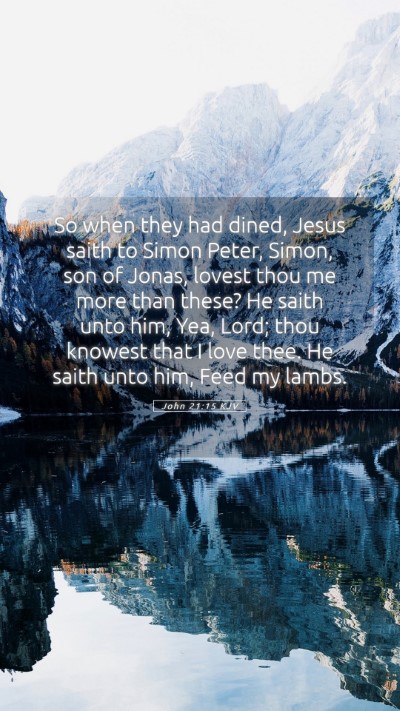Old Testament
Genesis Exodus Leviticus Numbers Deuteronomy Joshua Judges Ruth 1 Samuel 2 Samuel 1 Kings 2 Kings 1 Chronicles 2 Chronicles Ezra Nehemiah Esther Job Psalms Proverbs Ecclesiastes Song of Solomon Isaiah Jeremiah Lamentations Ezekiel Daniel Hosea Joel Amos Obadiah Jonah Micah Nahum Habakkuk Zephaniah Haggai Zechariah MalachiJohn 21:15 Meaning
What is the meaning of John 21:15?
So when they had dined, Jesus saith to Simon Peter, Simon, son of Jonas, lovest thou me more than these? He saith unto him, Yea, Lord; thou knowest that I love thee. He saith unto him, Feed my lambs.
John 21:15 Bible Verse Meaning
Understanding John 21:15
The verse John 21:15 states: "So when they had eaten breakfast, Jesus said to Simon Peter, 'Simon, son of Jonah, do you love Me more than these?' He said to Him, 'Yes, Lord; You know that I love You.' He said to him, 'Feed My lambs.' This passage holds profound significance in understanding the relationship between Jesus and Peter, and, by extension, His followers. Below we will explore various commentaries that provide insights into this pivotal moment in Scripture.
Bible Verse Meanings
This verse marks a crucial moment for Simon Peter, the disciple who had previously denied Jesus three times. It reveals the restoration of Peter after his failings and emphasizes the importance of love in service. The query posed by Jesus—asking Peter if he loves Him—serves as a foundational question for anyone seeking to understand Scripture and their relationship with Christ.
Bible Verse Interpretations
- Matthew Henry: Henry emphasizes that Jesus, after His resurrection, takes special care of His disciples. His question about love indicates that Peter’s heart needs to be examined to ensure that he is committed to spreading the gospel. The repeated questioning serves to confront Peter's earlier denials, allowing for reconciliation and a renewed assignment.
- Albert Barnes: Barnes elaborates on the significance of the phrase "more than these," interpreting it as a call to a deeper commitment. He points out that Jesus is asking Peter to evaluate his priorities and affections concerning both the other disciples and material possessions. This acknowledgment of love is tied closely to the responsibility of shepherding and caring for Jesus’ followers, depicting a leadership role for Peter.
- Adam Clarke: Clarke discusses the implications of feeding the lambs, interpreting it as a directive for Peter and future leaders. Clarke highlights that the term 'lambs' symbolizes the vulnerable and needy, an aspect of pastoral care. The correlation between love and responsibility illustrates that genuine love for Christ naturally leads to service in His name.
In-Depth Analysis of the Verse
This encounter occurs after the resurrection when the disciples are disheartened and reconsidering their futures. Jesus’ interaction with Peter is rich with themes of forgiveness, love, and duty. It reveals the heart of the Christian mission: to love Christ and, from that love, to care for others.
Theological Implications
This discourse teaches that love for Jesus is intrinsically linked to the care of His flock. By asking Peter if he loves Him, Jesus emphasizes that true love requires action. This is a key principle in biblical exegesis: that faith must always manifest in works.
Significance of the Exchange
The repeated questioning (three times) serves as a reminder of Peter’s earlier failures. It also highlights the mercy of Christ—giving Peter the chance to affirm his love and reestablish his role. This moment sets the tone for Peter’s future leadership in the early church.
Application of the Verse
For those engaging in Bible study, this verse challenges believers to reflect on their love for Christ and how it translates into their daily lives. It encourages readers to ask themselves how they can serve others as an expression of their faith.
Related Bible Cross References
- Matthew 26:75 - Peter's denial and restoration.
- John 10:11 - Jesus as the Good Shepherd.
- 1 Peter 5:2 - Peter's role in shepherding God’s flock.
Conclusion
John 21:15 serves both as a personal restoration moment for Peter and as a profound teaching on the nature of love and service in Christianity. By understanding the implications of this verse through public domain commentaries, believers can gain important insights into not only the historical context but also the application of Jesus' teachings in their own lives. These reflections can facilitate deeper Bible study insights and foster a commitment to serving others as followers of Christ.


